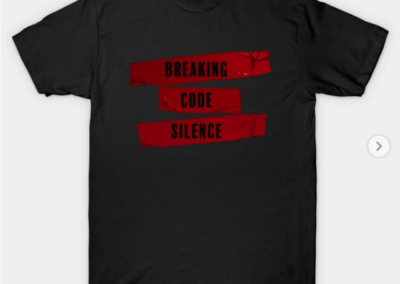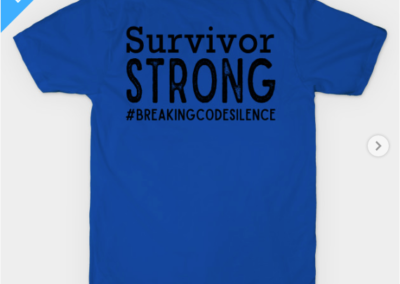In the opening statement, the prosecutor lays out the charges and the case the jury will hear. Some of the notable quotes we found interesting:
A Level 1 had certain restrictions. Food was a privilege there. So as a Level 1, you couldn’t eat ketchup and mustard. You couldn’t have the salad dressing at the salad bar, things like that. So you had to earn condiments on Level 1.
As a Level 1, you couldn’t talk to people. There was certain people you could talk to. Again, it all went with what the rules were. But Level 1s weren’t allowed to talk to each other; they weren’t allowed to talk to staff. It was part of the discipline.
Also at the academy, there was a lot of self-policing, student policing that went on. So not only was the environment this very rigid environment where the kids really weren’t allowed to have conversations with each other very much, but there was also a lot of policing enforced.
So if you got to a certain level, then you got to start giving consequences to the other kids. And it really–you’ll see that it really nurtured this environment of distrust between students of, it’s a big deal to be able to get to give consequences and the mentality that may go with that.
You will also find that there just was very little room for mistakes. Like most people sometimes would just have a bad day, well sometimes a bad day at Midwest Academy may be where you were sitting in the OSS room, the Out of School Suspension room. A bad day of too many consequences or shouting out at a teacher or getting in a fight with another student can lead you to a place where you’re stuck in a room, a room that doesn’t have a handle on it. When the door locks, it’s shut. It’s really small. It’s concrete. There’s nothing in there. The lights are on for 24-7. There’s a camera watching you at all times.
You are expected to sit in what’s called structure, which means that you must sit on the floor with the concrete. There are about three positions you are allowed to sit in. One of those could be sitting on the floor with your legs straight out, hands at the side, and you must sit and not move and not talk. And if you want to change positions, then you have to raise your hand and you have to wait for someone to see you through the camera and tell you over the speaker that you can move. But if you can move, it can just be to one of the other positions, which is maybe pulling your legs up to your chest and sitting like that for twenty-four hours.
When you were in the Out of School Suspension room and you had to sit in structure, and the only way you can get out is if you sit in structure twenty-four hours in those types of positions, not moving.
You’ll hear that there has been some variations throughout the time that–sometimes if you did it for a few hours, then they would actually bring you a chair that you could sit down on and sit still quietly and not move. At nighttime, if you were good, you would get your mattress and sometimes your sleep time would count for your structure time, sometimes not. If you were bad and you weren’t sitting quietly or you were yelling or throwing a fit because you wanted to get out, you wouldn’t get a mattress. You would sleep on the concrete floor, if you slept at all. So that’s what could happen on a bad day at Midwest Academy.
The other thing with the Out of School Suspension rooms is that you got different food there. Like I said, food was a privilege at Midwest. A mattress was a privilege at Midwest.
What you won’t find, though, is that the therapy sessions were–well, No. 1, they weren’t always private, because the academy didn’t like to have a child alone without another child there, and that’s understandable for some reasons. But when you have these kids who are needing this treatment and this therapy, they go to their counselor and they’d have another student sitting there where they were expected to talk about private things or whatever it may be and get some help, but there’s always somebody else there.
A lot of that ties into Count II. Count II is Sexual Exploitation by a Counselor. Now, the Defendant is not a counselor. He doesn’t have a college degree to say that he’s a counselor, and doesn’t have the education or training for it. But he held himself out to be one.
So as the family representative, he was able to spend time with her and put her out more and things like that. But he also spent a lot more time having these discussions. I mean, the Defendant always wanted to talk to the kids. The Defendant, especially with [sexual abuse victim], always wanted to talk to her about problems in her life, about what things she could do to make things better. He would encourage her to come talk to him about those things. At one point he said, don’t talk to Jane your counselor about it. You need to come talk to me.
Some of these students will tell you about the sexual surveys that the Defendant handed out to them. It was a survey–you’ll see it–that has these specific questions explicitly asking things about sex: When did you first have sex? What do you like during sex? Do you masturbate? Different questions like that. That was the Defendant’s survey. He was the one that gave it to the kids. He was the only one that took care of that part of it. The counselors didn’t even know that those surveys existed or were being handed out to students.
You will also hear a lot of the girls talk about the special attention that he gave to [sexual abuse victim]. I mean, it didn’t go unnoticed at the school. And in fact, it didn’t really help [sexual abuse victim] out a lot because a lot of the girls were really jealous of it, and they’d get mad about it and didn’t think it was fair that she got that kind of attention.
And the trips that the Defendant would take some of the girls on, some of the upper levels, he took them shopping to Victoria’s Secret so they could pick out bras and underwear. At Midwest Academy the bras and underwear they were given were plain with nothing to them. But for whatever reason, the Defendant took it upon himself to take some of these teenage girls on numerous occasions to go shopping at Victoria’s Secret.
They brought their son XXXX. He ended up locked in a room for about half of his time there, almost–well, over 50 percent. While you’re in OSS, you’re not allowed to do any school work. You do nothing while you’re in there. He lost a lot of weight while he was in there. When they finally left MWA, Midwest Academy, he had to repeat his entire seventh grade year because of the little schooling that he received when he was there. He was sexually assaulted when he was there. He was only 12 and 13. A group of boys in a family–they called them families, the groups that they put the kids in. That’s your family. They put a particular group of boys together and some sexual incidents had occurred. XXX was involved with that and was one of the youngest kids there. The kids ranged from 13 to 17. He wasn’t kept safe.ZZZZ was 12 years old when he was taken to Midwest Academy. It was the same thing. His mom wanted to get him some help. She was promised therapy. She was promised structure. ZZZZ spent about 63 percent of his time in the locked control rooms, no school, restricted meals, restricted access to human contact.ZZZZ deteriorated in OSS. And get the Catch-22 of that, because if you get put in that room and you start feeling like you’re going a little crazy, and then you start acting that way, well it just lengthens your time, right? Because you have to sit still, you have to sit in structure. With ZZZZ, you’re going to hear things of banging his head on the wall, of smearing feces on the wall, of self-harming himself, multiple things of how his mental health was affected when he was in those control rooms.
ZZZZ will be here to speak about being in those rooms and being at Midwest Academy, and you can hear that from him. ZZZZ deteriorated so badly while he was at Midwest Academy that the counselors there were saying he should not be here; he needs to go somewhere else. But the Defendant decides who stays and who goes.
The day ZZZZ was brought home from the academy, the next day he was put in the hospital for malnutrition. That’s how badly he had deteriorated there.
But what you’ll find out is that itwas an employee, Cheyenne Jerred, who actually kind of broke everything open and brought things to an end. Why? Because Cheyenne Jerred found out about [sexual abuse victim]. [sexual abuse victim] had started making some comments about how she didn’t feel comfortable around Mr. Ben. Cheyenne Jerred was a night staff. Cheyenne Jerred was not supposed to be talking to the kids, but [sexual abuse victim] started talking to her, and Cheyenne listened and she actually did something about it. Now, [sexual abuse victim] didn’t disclose everything at the beginning. And you’re going to hear that that’s normal. Kids don’t just the first time they talk sit down and just say, okay, this is everything that happened that he ever did to me. You’ll hear that that’s not normal, that kids disclose over time, that they test the waters. They see, is this person going to believe me or not? And that’s what [sexual abuse victim] did.
Click here for full opening statement











